|
|
|
Sort Order |
|
|
|
Items / Page
|
|
|
|
|
|
|
| Srl | Item |
| 1 |
ID:
127848
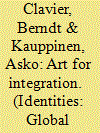

|
|
|
|
|
| Publication |
2014.
|
| Summary/Abstract |
Cities increasingly use artistic and cultural activities to promote active citizenship and social cohesion. We suggest that city-sponsored cultural and artistic practices in Sweden are finding a new discursive context in migration. In this article, we look at two artistic and cultural institutions in Malmö, Sweden: Arena 305 and Drömmarnas hus. We develop a typology of governmentalisation based on the work of Nicholas Rose and Peter Miller, which allows us to describe the governing activity of Arena 305 and Drömmarnas hus. What becomes visible is the discrepancy between the moral form of the political rationalities and the technologies of government: even though institutions may harbour ideals and principles of inclusion, they are perfectly capable of sustaining activities that brighten the very boundaries they set out to challenge.
|
|
|
|
|
|
|
|
|
|
|
|
|
|
|
|
| 2 |
ID:
176282
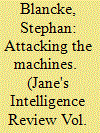

|
|
|
| 3 |
ID:
143639
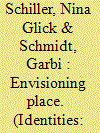

|
|
|
|
|
| Summary/Abstract |
This special issue focuses on ‘ways of seeing’ the city and raise questions about current dominant epistemological frameworks for understanding the urban-based sociabilities of people whom policy-makers and researchers frequently speak about as foreign, diverse and requiring integration. Read together, the articles contribute to an emerging relational social science by approaching urban sociabilities through four interrelated parameters: (1) a concept of place-making situated within trajectories of differential and multiscalar power; (2) a discursive analysis of narratives and silences, including those about diversity and cultural difference, formulated by actors within different scales of power; (3) an analysis of how different temporalities make visible or invisible the presence, agency and interconnection of various actors engaged in city-making; and (4) a re-engagement with the notion of ‘the social’, so that diversity, variation, mobility and conflict are seen as aspects of all urban social life, and not exclusively an attribute of ‘the other’.
|
|
|
|
|
|
|
|
|
|
|
|
|
|
|
|
| 4 |
ID:
131789
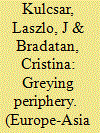

|
|
|
|
|
| Publication |
2014.
|
| Summary/Abstract |
The impact of ageing on community well-being has been part of the policy discourse in the West, but it is a relatively new problem for the post-socialist countries in Eastern Europe. This study focuses on the patterns of ageing in rural Romania and Bulgaria, offering a holistic view of vulnerabilities, including persistent rural disadvantages, ageing in the countryside and the post-socialist transformation. Aggregate Statistics and community case studies reveal the links between demographic processes and community development. This paper contributes to the country-specific analysis of the ageing European periphery in the context of social cohesion as a fundamental European goal.
|
|
|
|
|
|
|
|
|
|
|
|
|
|
|
|
| 5 |
ID:
111867
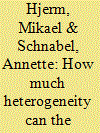

|
|
|
|
|
| Publication |
2012.
|
| Summary/Abstract |
Cultural and economic heterogeneity is often seen as a major threat to modern welfare states. This article contributes to the discussion of how much heterogeneity the welfare state can endure by theoretically and empirically focusing on the relationship between different levels of national identity and the support for welfare state policies. We analyse the effect of different types of national identity on attitudes towards taxation and redistribution. We show that it is the subjective aspect of national identity, or social cohesion, that in fact matters for predicting attitudes to the welfare state. In comparison, more objective measures of heterogeneity like the inequality of income distribution, language fractionalisation or the percentage of foreign-born individuals do not have any effect on attitudes to the welfare state.
|
|
|
|
|
|
|
|
|
|
|
|
|
|
|
|
| 6 |
ID:
134335
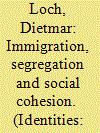

|
|
|
|
|
| Summary/Abstract |
In this article, we analyse immigrant integration against the background of German society’s social cohesion. First, we examine the integration process and policies with regard to the integration of first-generation labour migrants into the German ‘national society’ since the 1960s. Even though these ‘guest workers’ were confronted to ethnic and political exclusion owing to the so-called German integration model, they experienced socio-economic integration and, at the local level, some form of political participation. Secondly, we analyse the policies and the integration process of immigrant youth, specifically those of Turkish descent, into contemporary German society, the social cohesion of which is impeded by social exclusion and urban segregation. Our hypothesis is that – in spite of a long-standing refusal to recognise itself as an immigration country – Germany has to some extent incorporated its migrants and achieved an integration consensus, while paradoxically, national integration models in several other Western European countries are currently going through a deep crisis.
|
|
|
|
|
|
|
|
|
|
|
|
|
|
|
|
| 7 |
ID:
134333
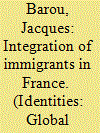

|
|
|
|
|
| Summary/Abstract |
This article seeks to identify the different factors that have facilitated or impeded the integration of immigrants in France from a historical perspective. Its aim is to shed light on the contemporary debates on the alleged failure of the republican integration model. First, we will show that – with the formation of the nation state – the integration of migrants was a constitutive element of the social cohesion of French society. Later, and during periods of xenophobia in particular, immigrants were classified according to their ability to assimilate into the French society. Since the 1970s, the double-barrelled integration question – concerning migrants and social cohesion – has reappeared. Within this context, the ‘colour-blind’ French republican model has been challenged, primarily from an economic perspective, not only by persistent social inequalities, but also, in its quintessence, by demands for cultural recognition. These factors have reinforced racial discrimination, the success of the populist extreme right and recurrent assimilation pressure.
|
|
|
|
|
|
|
|
|
|
|
|
|
|
|
|
| 8 |
ID:
122471
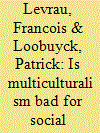

|
|
|
|
|
| Publication |
2013.
|
| Summary/Abstract |
Multiculturalism as an official policy strategy has recently come in for significant criticism in a number of Western European countries. A key criticism is that multicultural policies undermine redistribution policies, since they would erode the social cohesion upon which redistribution measures are built. However, empirical research does not univocally confirm this critique. This article explains why this is the case. The first argument is called the integration-recognition paradox. Policies that focus on recognising minority groups may lead to a greater social acceptance of those minorities, and in turn may lead to their feeling more appreciated as participants in society. In a second argument, the authors discuss how multicultural policies could easily be combined with policies that invest in national unity and social cohesion.
|
|
|
|
|
|
|
|
|
|
|
|
|
|
|
|
| 9 |
ID:
190786
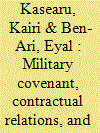

|
|
|
|
|
| Summary/Abstract |
The military covenant is a set of morally binding expectations marking the exchange between military, society, and the state. Its base is the military’s duality: like other large public institutions delivering services and its uniqueness in holding the monopoly over the use of legitimate organized state violence. The covenant is a form of relational (not transactional) contract based on trust between, and a long-term orientation of, partners; it both orders and displays these relations thereby offering both prescriptions for action and discursive means to legitimate them. The covenant can be used as an analytical (not normative) concept for theoretical development in three areas: social change and society-military ties, processual aspects of agreements between individuals and groups and the armed forces, and links between society-military ties and the social contract and social cohesion. We use the case of Estonia to illustrate the theoretical potential of the military covenant.
|
|
|
|
|
|
|
|
|
|
|
|
|
|
|
|
| 10 |
ID:
141160
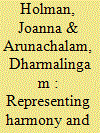

|
|
|
|
|
| Summary/Abstract |
This article investigates multiculturalism and ethnicity in Singapore. The study conducted a qualitative content analysis of articles appearing in the Straits Times newspaper over a three month period in 2010. It was found that multicultural harmony tended to be represented as unnatural, fragile, and requiring government intervention. There also tended to be a focus on distinct and fixed ethnic identities, reflecting an essentialist understanding of ethnicity. These beliefs about the nature of multiculturalism and ethnic identity were reflected in the coverage of three major social issues. These were the perceived needs to maintain the ethnic composition of Singapore’s population, efforts to prevent cultural corruption or neglect, and concerns about the impact of immigration on multicultural harmony.
|
|
|
|
|
|
|
|
|
|
|
|
|
|
|
|
| 11 |
ID:
074883


|
|
|
|
|
| Publication |
2006.
|
| Summary/Abstract |
The Social Map is an attempt to formulate an integrative theoretical model of individual and collective identity processes that draws upon sociological, psychological and biological knowledge in an effort to move towards a more comprehensive understanding of key questions surrounding the construction of experience and identification. This article summarizes the key features of the approach and considers the way in which it might offer a useful perspective on key questions relating to identities, power relations, social cohesion and conflict, including the way in which the bio-psychosocial processes that underlie these social phenomena can be seen to mediate if not structure their expression at the macro level within and across societies.
|
|
|
|
|
|
|
|
|
|
|
|
|
|
|
|
| 12 |
ID:
143642
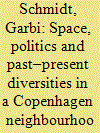

|
|
|
|
|
| Summary/Abstract |
This article responds to the need for a cautious use of the concepts of diversity and social cohesion in migration research. Presently missing in the literature is a historicisation and contextualisation of these concepts that can highlight the heterogeneity of diversity. In our investigation of the cities and neighbourhoods in which migrants settle and how migrants affect these neighbourhoods, it is important to ask whether the diversity of today is significantly different from the diversity a hundred years ago. To provide the missing perspectives, I offer a situated historical analysis of empirical data and ethnographic fieldwork in Nørrebro, a neighbourhood of the Danish capital, Copenhagen. Situating the contemporary heterogeneous characteristics of cities and neighbourhoods within a local history of diversity is useful for our understanding of past and contemporary social solidarities that underlie the perceptions of ‘otherness’ and the changing implications of the focus on immigrant identity.
|
|
|
|
|
|
|
|
|
|
|
|
|
|
|
|
| 13 |
ID:
160876
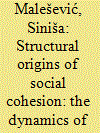

|
|
|
|
|
| Summary/Abstract |
This article explores the dynamics of social cohesion on the frontline. It attempts to show how micro-level solidarities largely depend on macro level organisational processes. I argue that frontline social cohesion is often the product of social development linked with the organisational structure. This general argument is applied to the case studies of two armed forces involved in the 1991–1995 Wars of Yugoslav Succession – the Croatian Army (HV) and the Bosnian Serb Army (VRS). Drawing on in-depth interviews with the former combatants I show how HV social cohesion played an important role in winning the war and how these networks of micro-level solidarity were shaped by long term organisational development.
|
|
|
|
|
|
|
|
|
|
|
|
|
|
|
|
| 14 |
ID:
082695
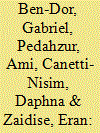

|
|
|
|
|
| Publication |
2008.
|
| Summary/Abstract |
This study examines conditions of peace and war to find whether the "rally `round the flag" effect is indeed attributed to rising levels of social collectivism. Reserve service motivation in peacetime and wartime was compared among 1,004 Israeli reservists. Levels of motivation and the factors that affect them were examined during the optimism of the Israeli-Palestinian peace process (February 2000) and about a year and a half into the second Intifada (October 2000). Findings suggest that motivation to serve in wartime is indeed higher than in peacetime. However, they also suggest that similar factors predict motivation in both times, although their relative impact is altered by the situation. Reservists were more likely to be motivated by individual rather than collective incentives (in both peacetime and wartime situations), thus suggesting that "rally `round the flag" occurrences are not necessarily reflective of the social cohesion and collective reasoning.
|
|
|
|
|
|
|
|
|
|
|
|
|
|
|
|
| 15 |
ID:
177067
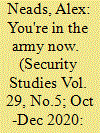

|
|
|
|
|
| Summary/Abstract |
Military integration is intended to facilitate postconflict stabilization by creating unified armed forces from formerly antagonistic armed groups. However, integrated armies often struggle to overcome the factional identities of their soldiers, raising questions about interventionists’ ability to produce military cohesion during such processes. Yet, in the established scholarship on military cohesion, largely derived from the study of Western armed forces, internal small-group social dynamics are privileged over and above broader societal and political identities. This article examines the postconflict military integration program conducted in Sierra Leone to test extant theories of military “social cohesion.” Contrary to theoretical expectations, military cohesion in Sierra Leone proved highly reliant on wider (and highly politicized) societal identities, undermining integration efforts. This finding not only challenges existing understandings of social cohesion and its determinants but also the utility of military integration as a vehicle for postconflict stabilization and civil-military change.
|
|
|
|
|
|
|
|
|
|
|
|
|
|
|
|
|
|
|
|
|